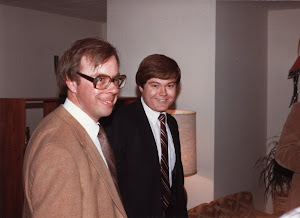1. What does this past Kansas debater look like now?
2. What does this ex-debater now do for a living?
Gary is an Adjunct Professor of International Affairs at Columbia University, and is executive director of the Gulf/2000 project.
3. Has this former debater been "in the news"?
He is frequently cited as an expert on Iran. This came from an August 18, 2005, Voice of America report:
Columbia University Middle East Studies Professor Gary Sick, a former Iran analyst at the National Security Council, says the new Cabinet represents a changing of the guard in Iran to the generation that fought the Iran-Iraq war.GS was the Iran specialist on the National Security Council during the Ford, Carter, and Reagan administrations.
"I think, we are going to see a much more self-confident behavior among these people, at least in the beginning," he said. "They may discover that confidence is not justified. But I think, they are coming into it, not as a youthful group looking up to their elders, but as a group that has fought the battles of Iran over the past 20 years, and they are, in their own view, now ready for power."
Gary may have coined the phrase, "the Iraq Syndrome." Look for more frequent use in the next decade.
Earlier this year, the College of Liberal Arts and Sciences at KU gave GS an Alumni Distinguished Achievement Award.
4. What else do we know?
GS called one of his books October Surprise...and his was a doozy:
Gary Sick, the National Security Council expert on the Middle East at the time, soberly reports in October Surprise of an alleged clandestine deal between the Iranian mullahs and Ronald Reagan's campaign operatives. In return for holding the fifty-two Americans until after the election, the Republicans promised to pay back Iran through surreptitious arms deliveries via Israel. The book's implicit message is that without the foul play, the Reagan-Bush era may never have occurred. If the allegations are true, the 1980 election would be, in Sick's words, the first "political coup" (p.12) in American history.The book came out in 1991.
More recently, in American Dynasty, Republican-journalist Kevin Phillips looked at the evidence made public since 1992 and concluded that the story is plausible. Phillips looked at data from French, Iranian, Russian and Israeli sources. Former Iranian President Abolhassan Bani-Sadr corroborated GS's account in his own book.
Update 9/14/05: After receiving an email from GS, I corrected his current work responsibilities.


No comments:
Post a Comment